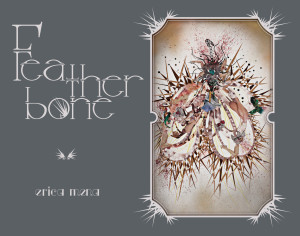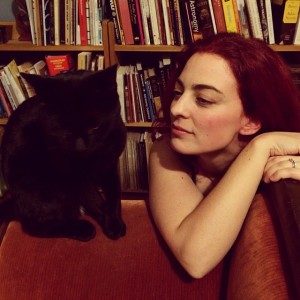 Book Title, Press, Year of Publication:
Book Title, Press, Year of Publication:
Featherbone, Ricochet Editions, 2015
Synopsis: Featherbone is a book-length cyborg feminist poem retelling the Icarus story.
What do you think makes your book (or any book) a “project book”?
Featherbone was always envisioned as a single work, rather than a collection of works, and to me that’s the main difference between project books and others. Though there are individual sections of the book, they demand a sequenced reading, working towards a single and unified effort: the slowing or stopping of time at the moment when Icarus is penetrated by the machine-wings she wears, and becomes transformed, and the sensual, bodily description of that. Most of my favorite books are project books, and one thing I think they have in common is that they demand to be taken whole, rather than in pieces, to be fully engaged with.
Why this subject (or constraint)?
I studied mythology, archeology, and ancient history before I turned to literature, and if there is any religion in my upbringing at all it was that we were thoroughly versed in ancient Greek mythology. For a long time I thought that these stories were off limits to contemporary poets, because it had all “been done” already, especially the re-imagining from a feminine/feminist perspective. But at some point I stopped stopping myself and just wrote what I was imagining, and this is what it was.
Are you comfortable with the term “project book”?
Yes, I think I do like it. I approach all my artistic work as project-based, and though I recognize that’s not the approach that works for everyone, it is extremely productive for me. It helps me find an entry point, and recognize when I’ve done everything I can on a subject. Poetry is the lens through which I engage in the world, and a tool for me to learn about things that interest me, and my work is all very research-based, so it helps to set up constraints and limits at the beginning of the research to help me shape the book. I’m very comfortable thinking at the level of the book (just as I imagine some writers prefer the level of the poem, paragraph, or story). I think of it as analogous to a “concept album.”
Did you fully immerse yourself in writing this project book, or did you allow yourself to work on other things?
I write very slowly, so I tend to work on many fronts simultaneously, though there is always a primary project. So for the three years I was working on Featherbone it was the primary project, but I started three additional poetry projects, made over a dozen books as a book artist, and translated four books from Spanish. I think of all of these as book projects in their own way—they are in book form, have clearly defined limits, and a clear scope. Having a variety of projects to work on simultaneously makes everything more exciting, and I find that the projects unexpectedly feed one another.
As a reader, are you drawn to project books? What project books have influenced you or have you enjoyed, and what do you think makes those books successful?
I am very much drawn to project books. I just finished reading Lisa Roberson’s Cinema of the Present, which is a phenomenal project book that uses repetition in a way that made the book immensely successful, almost like refrains in a symphony. Also the recently-translated Diorama by Roció Ceron (translated by Anna Rosenwong) is a book-length work (which meets my criteria for a project book) that works by creating its own poetic world, its own linguistic context that the reader has to surrender to and immerse herself into, my favorite element of a project book. And Diana’s Tree by Alejandra Pizarnik, in translation by Yvette Siegert, which is one of the most important works of Latin American poetry, and works so well with silence and sustained musicality at the level of the book. So yes, musicality, repetition, and a demanding, singular linguistic context to define a poetic world are the elements of project-books that most appeal to me.
After completing a project, how did you transition into writing something new? What are you working on now? Another project?
I tend to work on many projects simultaneously, though there is always a primary project. I work also in many genres: I’m a poet, a translator, and a book artist. So turning my focus from one to the other helps me come up with new ideas. I keep a list of ideas, and notes towards new projects, and sometimes even start writing towards something while working on the previous. For the last two years, while translating a few books, and finishing Featherbone, I’ve been making notes towards a new project book that I hope to finish this year. It’s tentatively called Theories of Dark and is about darkness, starting with an historical astronomical and cosmological understanding of darkness, and more interestingly what we don’t understand (particularly about dark matter and dark energy).
What advice can you offer other writers, particularly emerging writers or poetry students who may be using the project book as a guiding principle for their own work?
The hardest thing I’ve had to do as a poet is to stop self-censoring and self-silencing. Especially as a latina, woman poet, who writes experimentally. All the self-censoring I was doing was out of fear, and the desire for acceptance. But it turned out that poetry is a vast, broad world with many different communities, and so when I finally stopped trying to conform myself to what I perceived were the expectations of mainstream poetry and my identity, I found that there were groups of poets out there doing the work I wanted to be doing. A community, in spirit if not in physical reality. So this is not just about project books (though many of the writers I most admire do work in that mode), but more about finding a community of like-minded writers whose work encourages and nourishes your own, instead of trying to conform to expectation or demand.


